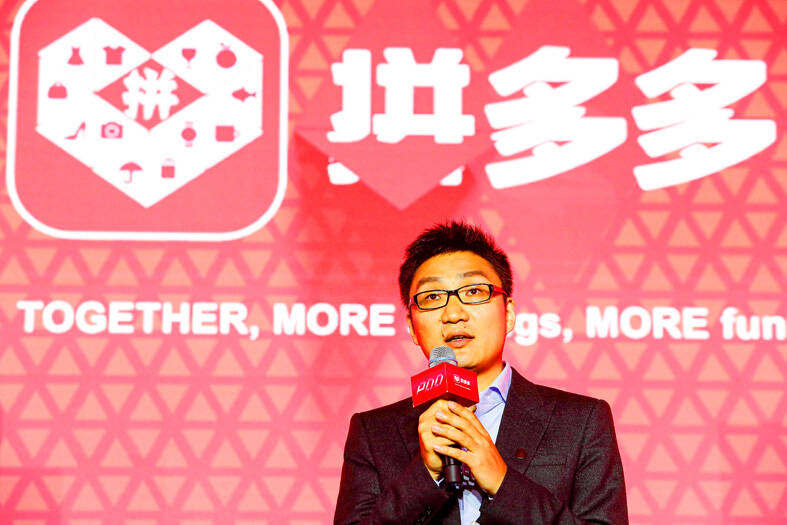E-commerce tycoon Colin Huang (黃崢) has become China’s richest man, an index showed on Friday, capping an ascent for the former Google employee whose shopping site Temu has sucked in consumers with its low prices and powerful algorithms.
Huang, the founder of PDD Holdings Inc (拼多多控股) — which owns Temu and Chinese retail app Pinduoduo (拼多多) — is now worth US$48.6 billion, the Bloomberg Billionaires Index said.
He overtook beverage company Nongfu Spring (農夫山泉) founder Zhong Shanshan (鍾睒睒), who had topped the list since April 2021, as the world’s 25th wealthiest person and the richest in China.

Photo: AFP
Close behind them is tech giant Tencent Holdings Ltd (騰訊) cofounder Ma Huateng (馬化騰), also known as Pony Ma, whose WeChat is often described as China’s “everything app.”
In fourth place is Zhang Yiming (張一鳴), founder of Bytedance Ltd (字節跳動), which owns the massively popular TikTok video-sharing platform.
Huang, born in 1980 in the eastern Chinese city of Hangzhou, was a teenage mathematics whizz and a former employee of Google China. He founded online shopping site Pinduoduo in 2015, which blossomed into one of China’s most successful e-commerce empires — rivaling Jack Ma’s (馬雲) Alibaba Group Holding Ltd (阿里巴巴).
The app lured in consumers with huge discounts and a vast array of products, offering sometimes staggeringly low prices in a fiercely competitive field.
Its overseas iteration Temu launched in 2022 in the US, where it amassed a loyal consumer base with ultra-low-cost goods made and shipped from China.
Temu’s success dovetailed with persistently high inflation that has pushed cost-conscious consumers to hunt for bargains, and it has since taken off in Europe, Latin America and elsewhere.
Despite only arriving in Europe last year, Temu has said it has on average about 75 million monthly active users in the region.
However, its massive success had drawn accusations of unfair commercial practices and lax safety standards.
This year, consumer groups in Europe said Temu was manipulating shoppers into spending more money, distorting their ability to make “free and informed decisions.”
In April, South Korean regulators opened an investigation into Temu on suspicion of false advertising and unfair practices.
Last month, hundreds of merchants in China demonstrated at an affiliated office in the southern city of Guangzhou, alleging unfair treatment in the sale of their products on the platform.
However, that has done little to dent the success of the firm, with PDD Holdings announcing in May that first-quarter net profit had more than tripled year-on-year.
The firm’s US-listed shares closed at US$138.02 apiece on Thursday, giving it a market capitalization of US$191.68 billion.

When an apartment comes up for rent in Germany’s big cities, hundreds of prospective tenants often queue down the street to view it, but the acute shortage of affordable housing is getting scant attention ahead of today’s snap general election. “Housing is one of the main problems for people, but nobody talks about it, nobody takes it seriously,” said Andreas Ibel, president of Build Europe, an association representing housing developers. Migration and the sluggish economy top the list of voters’ concerns, but analysts say housing policy fails to break through as returns on investment take time to register, making the

NOT TO WORRY: Some people are concerned funds might continue moving out of the country, but the central bank said financial account outflows are not unusual in Taiwan Taiwan’s outbound investments hit a new high last year due to investments made by contract chipmaker Taiwan Semiconductor Manufacturing Co (TSMC, 台積電) and other major manufacturers to boost global expansion, the central bank said on Thursday. The net increase in outbound investments last year reached a record US$21.05 billion, while the net increase in outbound investments by Taiwanese residents reached a record US$31.98 billion, central bank data showed. Chen Fei-wen (陳斐紋), deputy director of the central bank’s Department of Economic Research, said the increase was largely due to TSMC’s efforts to expand production in the US and Japan. Investments by Vanguard International

EARLY TALKS: Measures under consideration include convincing allies to match US curbs, further restricting exports of AI chips or GPUs, and blocking Chinese investments US President Donald Trump’s administration is sketching out tougher versions of US semiconductor curbs and pressuring key allies to escalate their restrictions on China’s chip industry, an early indication the new US president plans to expand efforts that began under former US president Joe Biden to limit Beijing’s technological prowess. Trump officials recently met with their Japanese and Dutch counterparts about restricting Tokyo Electron Ltd and ASML Holding NV engineers from maintaining semiconductor gear in China, people familiar with the matter said. The aim, which was also a priority for Biden, is to see key allies match China curbs the US

STRUGGLING TO SURVIVE: The group is proposing a consortium of investors, with Tesla as the largest backer, and possibly a minority investment by Hon Hai Precision Nissan Motor Co shares jumped after the Financial Times reported that a high-level Japanese group has drawn up plans to seek investment from Elon Musk’s Tesla Inc to aid the struggling automaker. The group believes the electric vehicle (EV) maker is interested in acquiring Nissan’s plants in the US, the newspaper reported, citing people it did not identify. The proposal envisions a consortium of investors, with Tesla as the largest backer, but also includes the possibility of a minority investment by Hon Hai Precision Industry Co (鴻海精密) to prevent a full takeover by the Apple supplier, the report said. The group is